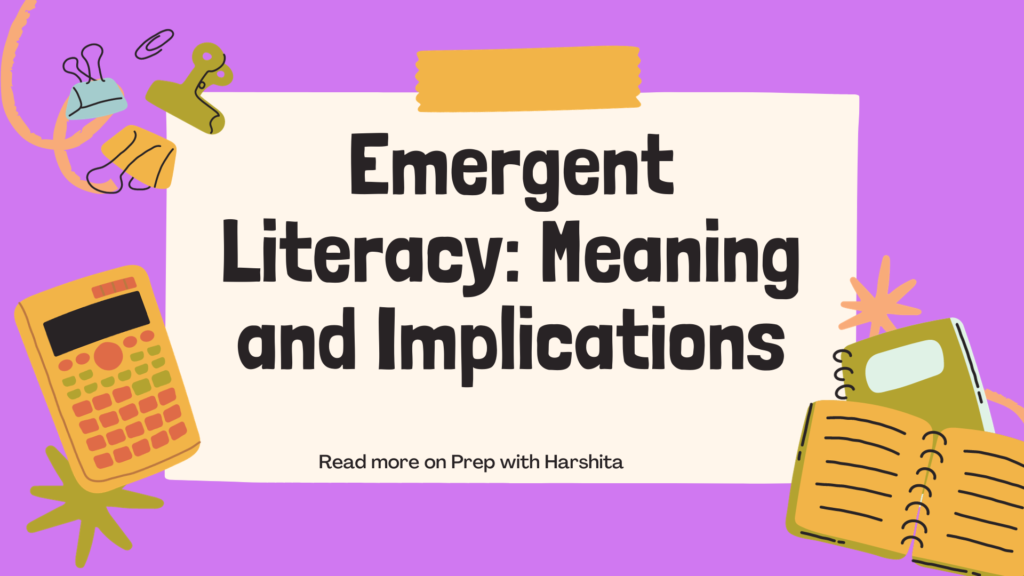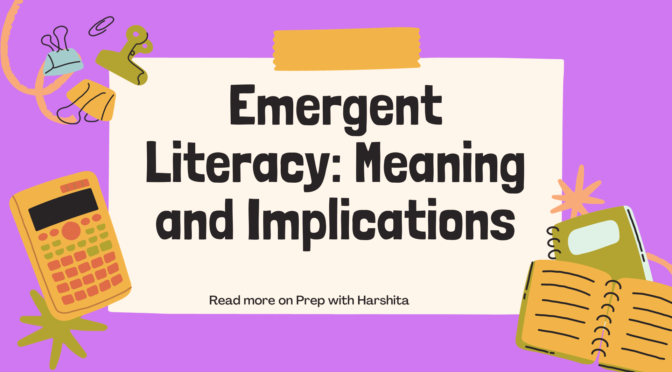Emergent literacy refers to the early, foundational skills and behaviors that children develop before they formally learn to read and write. It encompasses a range of language and literacy-related activities and experiences that set the stage for later literacy acquisition. Emergent literacy recognizes that literacy development begins in the early years of life, well before a child enters formal schooling.
Key Component of Emergent Literacy :
Oral Language Skills: The development of vocabulary, comprehension, and oral communication lays the foundation for reading and writing.
Phonological Awareness: The ability to recognize and manipulate the sounds of language, including rhyming, syllable segmentation, and initial sound awareness.
Print Awareness: Understanding the conventions of print, such as recognizing letters, understanding that print carries meaning, and awareness of the left-to-right directionality of reading.
Literacy-Related Behaviors: Engaging in activities that promote an interest in books and reading, such as pretending to read, exploring books independently, and asking questions about written language.
Also Read : Language Across the curriculum
Implications of Emergent Literacy:
Early Intervention is Critical: Recognizing and supporting emergent literacy skills in the early years can have a significant impact on later reading and writing success. Early interventions can prevent or address potential reading difficulties.
Play-Based Learning: Play serves as a natural and engaging context for emergent literacy. Activities such as storytelling, role-playing, and interactive games contribute to language and literacy development.
Family and Community Involvement: Families and communities play a vital role in fostering emergent literacy. Reading to children, providing access to books, and creating a literacy-rich environment at home contribute to early literacy development.
Multimodal Approaches: Incorporating a variety of modes of communication, including visual, auditory, and kinesthetic, supports emergent literacy. This can include using multimedia, interactive technologies, and hands-on activities.
Promoting a Love for Reading: Instilling a love for reading from an early age is crucial. Creating positive and enjoyable experiences with books helps children develop a lifelong appreciation for literacy.
Assessment for Early Identification: Regular assessment of emergent literacy skills helps identify areas of strength and areas that may need additional support. Early identification allows for targeted interventions.
Also Visit : Prep with Harshita



equilibrado estatico
Equipos de balanceo: importante para el operación fluido y óptimo de las máquinas.
En el ámbito de la ciencia avanzada, donde la rendimiento y la estabilidad del dispositivo son de máxima trascendencia, los sistemas de balanceo juegan un papel vital. Estos equipos específicos están concebidos para balancear y estabilizar partes rotativas, ya sea en maquinaria de fábrica, automóviles de movilidad o incluso en equipos domésticos.
Para los especialistas en reparación de aparatos y los profesionales, operar con equipos de equilibrado es importante para proteger el funcionamiento uniforme y seguro de cualquier sistema giratorio. Gracias a estas opciones modernas avanzadas, es posible disminuir significativamente las oscilaciones, el ruido y la tensión sobre los rodamientos, extendiendo la duración de piezas importantes.
Asimismo relevante es el tarea que cumplen los dispositivos de calibración en la asistencia al cliente. El ayuda especializado y el conservación constante usando estos aparatos facilitan brindar soluciones de excelente nivel, elevando la contento de los compradores.
Para los propietarios de negocios, la inversión en estaciones de ajuste y medidores puede ser fundamental para incrementar la efectividad y productividad de sus equipos. Esto es sobre todo significativo para los empresarios que dirigen modestas y pequeñas empresas, donde cada punto cuenta.
También, los sistemas de balanceo tienen una amplia utilización en el área de la protección y el control de nivel. Posibilitan localizar eventuales defectos, reduciendo reparaciones costosas y daños a los aparatos. Incluso, los información extraídos de estos aparatos pueden utilizarse para mejorar sistemas y aumentar la presencia en plataformas de búsqueda.
Las áreas de uso de los aparatos de balanceo abarcan múltiples ramas, desde la producción de ciclos hasta el control del medio ambiente. No afecta si se refiere de extensas producciones de fábrica o pequeños establecimientos de uso personal, los dispositivos de calibración son indispensables para garantizar un funcionamiento efectivo y sin detenciones.
Your article helped me a lot, is there any more related content? Thanks!
[b]Prevent Vibration Damage – Get Professional Balancing with Balanset-1A[/b]
Unbalanced rotors can cause serious damage to your machinery. Bearings wear out faster, motors consume more power, and failures lead to expensive repairs. [b]Balanset-1A[/b] provides professional-grade vibration diagnostics and balancing, helping businesses save money and improve reliability.
[b]Key Benefits:[/b]
– [b]Accurate & fast diagnostics[/b] – Identifies imbalance before it causes damage
– [b]Portable & efficient[/b] – Suitable for field and workshop use
– [b]User-friendly software[/b] – No special training required
[b]Choose Your Kit:[/b]
[url=https://www.amazon.es/dp/B0DCT5CCKT]Full Kit on Amazon[/url] – Includes all necessary sensors, software, and a protective case
Price: [b]€2250[/b]
[url=https://www.amazon.es/dp/B0DCT5CCKT][img]https://i.postimg.cc/SXSZy3PV/4.jpg[/img][/url]
[url=https://www.amazon.es/dp/B0DCT4P7JR]OEM Kit on Amazon[/url] – More affordable, comes with basic components
Price: [b]€1978[/b]
[url=https://www.amazon.es/dp/B0DCT4P7JR][img]https://i.postimg.cc/cvM9G0Fr/2.jpg[/img][/url]
Protect your equipment today with [b]Balanset-1A[/b]!
Balanset-1A: Cutting-edge Portable Balancer & Vibration Analyzer
Modern Dynamic Balancing Solution
Balanset-1A stands as an innovative solution for vibration correction of rotors in their own bearings, developed by Estonian company Vibromera OU. The device ensures professional equipment balancing at €1,751, which is significantly cheaper than traditional vibration analyzers while preserving superior measurement accuracy. The system enables in-place balancing directly at the equipment’s operational location without requiring removal, which is critically important for reducing production downtime.
About the Manufacturer
Vibromera OU is an Estonian company specializing in the creation and production of devices for technical diagnostics of industrial equipment. The company is established in Estonia (registration number 14317077) and has representatives in Portugal.
Contact Information:
Official website: https://vibromera.eu/shop/2/
Technical Specifications
Measuring Parameters
Balanset-1A ensures accurate measurements using a two-channel vibration analysis system. The device measures RMS vibration velocity in the range of 0-80 mm/s with an accuracy of ±(0.1 + 0.1?Vi) mm/s. The operating frequency range is 5-550 Hz with optional extension to 1000 Hz. The system supports rotational speed measurement from 250 to 90,000 RPM with phase angle determination accuracy of ±1 degree.
Operating Principle
The device employs phase-sensitive vibration measurement technology with MEMS accelerometers ADXL335 and laser tachometry. Two uniaxial accelerometers measure mechanical vibrations proportional to acceleration, while a laser tachometer generates impulse signals for determining RPM and phase angle. Digital signal processing includes FFT analysis for frequency analysis and proprietary algorithms for automatic computation of correction masses.
Full Kit Package
The standard Balanset-1A delivery includes:
Measurement unit with USB interface – main module with built-in preamplifiers, integrators, and ADC
2 vibration sensors (accelerometers) with 4m cables (optionally 10m)
Optical sensor (laser tachometer) with 50-500mm measuring distance
Magnetic stand for sensor mounting
Electronic scales for precise measurement of corrective masses
Software for Windows 7-11 (32/64-bit)
Plastic transport case
Complete set of cables and documentation
Functional Capabilities
Vibrometer Mode
Balanset-1A works as a complete vibration analyzer with abilities for measuring overall vibration level, FFT spectrum analysis up to 1000 Hz, measuring amplitude and phase of the fundamental frequency (1x), and continuous data recording. The system delivers display of time signals and spectral analysis for equipment condition diagnostics.
Balancing Mode
The device supports single-plane (static) and two-plane (dynamic) balancing with automatic calculation of corrective masses and their installation angles. The unique influence coefficient saving function enables significant acceleration of repeat balancing of identical equipment. A dedicated grinding wheel balancing mode uses the three-correction-weight method.
Software
The easy-to-use program interface provides step-by-step guidance through the balancing process, making the device accessible to personnel without specialized training. Key functions include:
Automatic tolerance calculation per ISO 1940
Polar diagrams for imbalance visualization
Result archiving with report generation capability
Metric and imperial system support
Multilingual interface (English, German, French, Polish, Russian)
Fields of Use and Equipment Types
Industrial Equipment
Balanset-1A is successfully applied for balancing fans (centrifugal, axial), pumps (hydraulic, centrifugal), turbines (steam, gas), centrifuges, compressors, and electric motors. In production facilities, the device is used for balancing grinding wheels, machine spindles, and drive shafts.
Agricultural Machinery
The device provides special value for agriculture, where continuous operation during season is critically important. Balanset-1A is used for balancing combine threshing drums, shredders, mulchers, mowers, and augers. The ability to balance on-site without equipment disassembly permits avoiding costly downtime during peak harvest periods.
Specialized Equipment
The device is effectively used for balancing crushers of various types, turbochargers, drone propellers, and other high-speed equipment. The speed frequency range from 250 to 90,000 RPM covers essentially all types of industrial equipment.
Benefits Over Alternatives
Economic Effectiveness
At a price of €1,751, Balanset-1A provides the functionality of devices costing €10,000-25,000. The investment pays for itself after preventing just 2-3 bearing failures. Cost reduction on external balancing specialist services amounts to thousands of euros annually.
Ease of Use
Unlike complex vibration analyzers requiring months of training, mastering Balanset-1A takes 3-4 hours. The step-by-step guide in the software enables professional balancing by personnel without specialized vibration diagnostics training.
Portability and Independence
The complete kit weighs only 4 kg, with power supplied through the laptop’s USB port. This enables balancing in outdoor conditions, at remote sites, and in hard-to-reach locations without separate power supply.
Versatile Application
One device is adequate for balancing the most extensive spectrum of equipment – from small electric motors to large industrial fans and turbines. Support for one and dual-plane balancing covers all common tasks.
Real Application Results
Drone Propeller Balancing
A user achieved vibration reduction from 0.74 mm/s to 0.014 mm/s – a 50-fold improvement. This demonstrates the outstanding accuracy of the device even on small rotors.
Shopping Center Ventilation Systems
Engineers successfully balanced radial fans, achieving decreased energy consumption, removed excessive noise, and increased equipment lifespan. Energy savings offset the device cost within several months.
Agricultural Equipment
Farmers note that Balanset-1A has become an vital tool preventing costly breakdowns during peak season. Lower vibration of threshing drums led to decreased fuel consumption and bearing wear.
Pricing and Delivery Terms
Current Prices
Complete Balanset-1A Kit: €1,751
OEM Kit (without case, stand, and scales): €1,561
Special Offer: €50 discount for newsletter subscribers
Bulk Discounts: up to 15% for orders of 4+ units
Purchase Options
Official Website: vibromera.eu (recommended)
eBay: verified sellers with 100% rating
Industrial Distributors: through B2B channels
Payment and Shipping Terms
Payment Methods: PayPal, bank cards, bank transfer
Shipping: 10-20 business days by international mail
Shipping Cost: from $10 (economy) to $95 (express)
Warranty: factory warranty
Technical Support: included in price
Final Assessment
Balanset-1A constitutes an perfect solution for organizations seeking to deploy an successful equipment balancing system without significant capital expenditure. The device makes accessible access to professional balancing, enabling small enterprises and service centers to deliver services at the level of large industrial companies.
The blend of reasonable price, ease of use, and professional capabilities makes Balanset-1A an indispensable tool for modern technical maintenance. Investment in this device is an investment in equipment dependability, lower operating costs, and enhanced competitiveness of your enterprise.